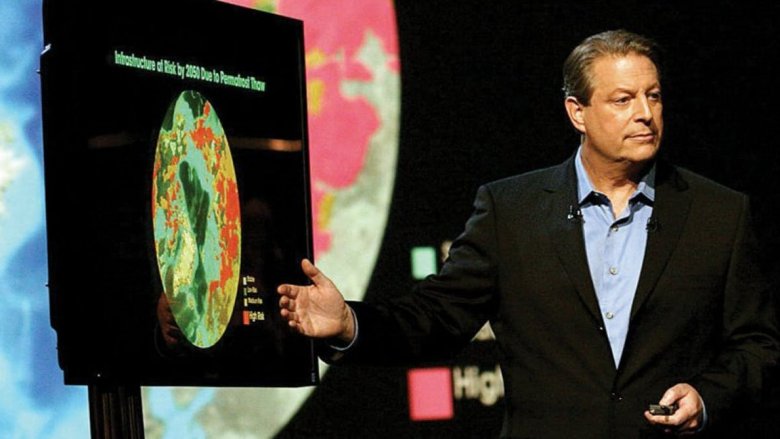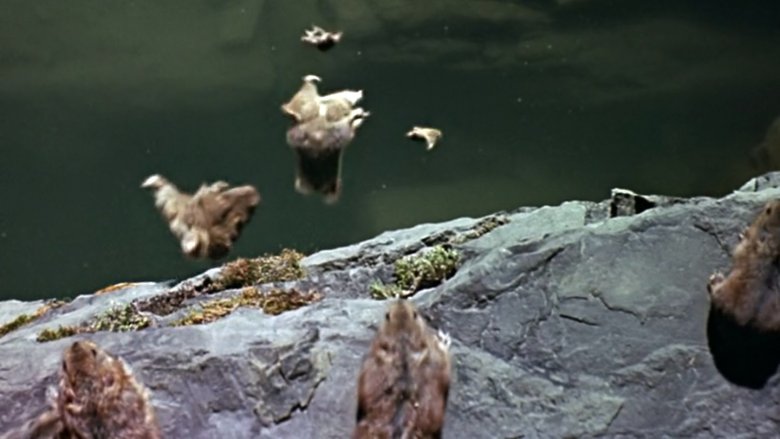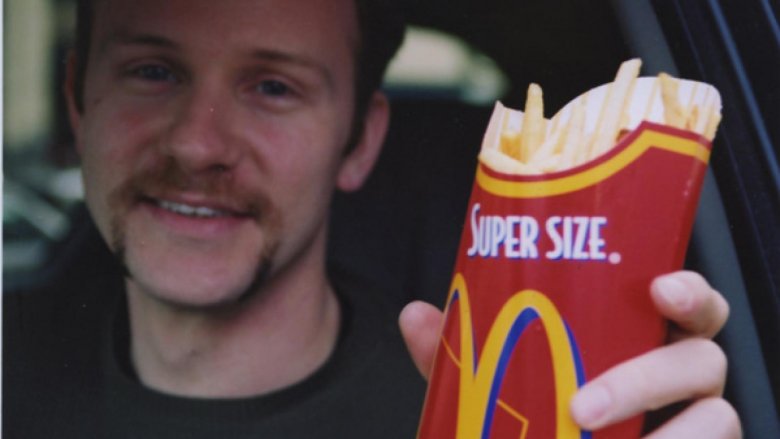Oscar-Nominated Documentaries That Lied To Your Face
They say a picture is worth a thousand words. With a standard count of 24 images per second, the average documentary must be worth more than a kazillion pieces of investigative journalism. In a mere 90 minutes, a great documentary can make us totally rethink what we thought we knew, whether by shining a light on hidden injustices, illuminating less explored corners of our natural world, or proving once and for all that Fyre Festival was just a really, really terrible idea. That's why we have the Academy Award for Best Documentary, to celebrate the times that truth really does turn out to be stranger than fiction.
Yeah, about that.
Sometimes, it turns out that maybe the truth needs a little bit of massaging to get that Oscar factor. And that's when there's even any truth to massage at all. Over the decades, the Academy has occasionally been so super-hyped over a movie that they've nominated it for an award ... only for viewers to belatedly discover that "accuracy" and "making it to the Oscars" don't always go hand in hand. From political propaganda to musical tales, these Oscar-nominated documentaries lied to your face.
Bowling for Columbine used fake quotes and selective editing
You're a human being alive in the early 21st century. You already have an opinion on Michael Moore, either as a fearless truth teller or a liberal shill (or, if you're below a certain age, as that dude you vaguely remember your parents arguing about last decade). While the rise of guys like Alex Jones has made Moore's docs look like a golden age of journalistic rigor, Moore sure did like to pull shady tricks. Exhibit one: his Oscar-winning Bowling for Columbine.
A semi-comic look at America's gun culture, Bowling for Columbine nabbed the Oscar thanks to scenes like Moore being given a free gun with his new bank account, a South Park-style animated history of America (above), and a combative interview with then-NRA president Charlton Heston. It also nabbed deserved criticism for its selective editing and deliberate misquotations.
Roger Ebert had an even-handed look at the claims. While the allegedly-staged bank stunt may or may not have been real, there's no question Charlton Heston's speech was edited to make the NRA look bad, or that in one scene, Moore completely made up an Air Force quote about killing Vietnamese people. Then there's that South Park-style animation. Matt Stone and Trey Parker weren't involved. By placing it right after an interview with Stone, Moore created the impression it was their work. As Stone told the BBC, "It was a good lesson in what Michael Moore does. ... He creates meaning where there is none by cutting things together."
Winged Migration involved trained birds and staged scenes
In 2001, Winged Migration set out to show the world just what horrors birds have to deal with flying south for the winter. And dear God, did it turn out to be horrible. There are scenes in this movie where birds get caught in oil spills, where ducks are gunned down by hunters, and where crabs swarm all over a chick and eat it alive. Accompanied by sparse narration, the film was so beautiful it was nominated for the Oscar, and so disturbing that it lost to Bowling for Columbine. (There were crabs! Eating a baby bird!)
Before you start wondering how it's possible for a factually inaccurate movie like Bowling for Columbine to win over an epic nature documentary, we need to let you in on a little secret. Winged Migration wasn't exactly a paragon of truth telling. A ton of its key scenes were secretly staged.
Most obviously, these were the days before drones, which meant filming the birds from an aircraft. To stop them from freaking out at all the humans up in the sky, some of the birds were raised by the crew (via Roger Ebert). According to MetroActive Movies, the director himself estimated 50 percent of the birds in his film were trained. Key scenes were also staged. At one point, the film shows a red-breasted goose wandering into a pool of crude oil ... in reality, a mixture of milk and vegetable dye. Hmm. We're actually kinda glad to hear that one.
Gasland blamed fracking for things that aren't exclusive to fracking
Gasland is the film that made "fracking" a globally recognized term. The story of director Josh Fox's journey to discover what, exactly, natural gas companies were planning when they offered him money to drill beneath his property, it popularized the anti-fracking movement, in large part thanks to the film concluding that fracking is terrifying. There are references to "mini-earthquakes" caused by fracking, and scenes where fire comes shooting out of taps in fracking areas.
Unfortunately for Fox's Oscar-nominated documentary, those are both things that can happen without ever involving fracking at all. Take the earthquake claim. A New York Times deep dive into the accuracy of Gasland explained that while fracking can cause mini-earthquakes, they'd be too faint for any human being to feel. There's also the fact that other, green sources of fuel can cause identical "mini-earthquakes", such as geothermal energy production.
This isn't even mentioning Gasland's big set piece, where residents living near fracking sites set water from their taps on fire. However, multiple scientific studies (cited here in Science Magazine) have concluded that fracking itself is "very unlikely" to cause the flames of Hades to come spewing out your faucet. Rather, it's down to badly constructed wells allowing methane to migrate towards the surface. That's probably not much comfort if it's your taps that are igniting, but it's also the sort of thing a serious documentary should really make clear.
March of the Penguins lied about what penguin life is really like
Back in 2005, a movie about adorable, tuxedo-wearing Antarctic birds playing happy families lit the media on fire. March of the Penguins' focus on the harsh journey emperor penguins take and the sacrifices they make for their young made an entire nation simultaneously go "awwwwww!" Add in a soothing Morgan Freeman voiceover, and it's no wonder the movie got the Oscar. Religious groups also went nuts for the film, trumpeting the family values of the monogamous penguins (via The Guardian).
This was ... unfortunate. While Freeman's voiceover takes care to filter everything through the prism of human friendly concepts like "love" and "family," actual penguins don't get married and settle down for life. Despite what March of the Penguins implies, most emperor penguins "cheat" on their partners by shacking up with some new penguin beefcake/floozy each year — a definition of monogamy you definitely shouldn't try applying to your marriage.
The issue is it makes zero sense to ascribe human motivations to non-human penguins. Vox has criticized Freeman's voiceover for taking a fascinating nature documentary and grafting a phony "love conquers all" parable on top of it that doesn't reflect actual penguin psychology. There's also the issue of how cozy March of the Penguins makes penguin life look. While the film doesn't completely ignore chick deaths in Antarctica's wastelands, it doesn't make clear just how prevalent they can be. During a bad year, the British Antarctic Survey notes "many" chicks will die of starvation. Not so heartwarming now, huh?
An Inconvenient Truth was legally found to be distorting facts
It's rare for an Oscar-winning documentary to be so controversial that its truthfulness winds up being judged before a court, but that's what happened to An Inconvenient Truth. Al Gore's 2006 lecture won two Academy Awards (Best Original Song was the second award, if you were wondering), and it became so famous that schools across the planet started incorporating it into their curricula. Some of those schools just happened to be in the United Kingdom, where they apparently take documentaries very seriously. In 2007, the film wound up before the high court, where a judge criticized it for a lack of balance and "nine scientific errors" (via The Guardian).
It's worth pointing out that the judge also concluded the film's overall message that climate change is gonna suck was indeed supported by the facts. But for a film labeled An Inconvenient Truth, there sure were holes in its truth-telling. Chief among these were Gore claiming the climate apocalypse could happen "in the near future," rather than in many years. Plus, there was his assertion that both Lake Chad drying up and Mount Kilimanjaro losing its snow were attributable to climate change. Amusingly, Kilimanjaro's vanishing snow is just about the only retreating glacier that isn't definitely caused by climate change (via Scientific American).
Gore also asserted that increased storms in the early 2000s, like Hurricane Katrina, were due to our CO2 addiction. Modern climate science actually thinks we'll have fewer, more intense storms thanks to climate change. That's, uh, good?
Waco: The Rules of Engagement was an Oscar-nominated documentary that sanitized David Koresh
On April 19, 1993, an FBI siege of the Branch Davidian compound outside Waco ended with the building spectacularly going up in flames. Over 75 Davidians died in the fire, with many blaming the FBI. Among those who felt the feds engaged in a coverup was William Gazecki, who, in 1997, released his own take on what had happened. Waco: The Rules of Engagement made a powerful case that the Branch Davidians hadn't broken the law and were victimized just because they were weird. Roger Ebert gave it 3.5 out of 4 stars, while the Academy nominated it for an award.
This makes sense if you agree with the film that the Branch Davidians were oddballs but not doing anything illegal. But you know what is illegal? Beating small children until they bleed. Or impregnating underage girls (via ABC). Or stockpiling illegal military assault weapons and explosives. Or opening fire on government agents executing a legal search warrant (via Dallas News). Or, you know, any of the dozens of abusive acts Koresh engaged in while leading his sect.
Waco: The Rules of Engagement was so one-sided in its treatment of what was happening inside the Davidian compound that the Southern Poverty Law Center called it propaganda. The group also questioned the film's insinuation that the FBI started the deadly fire, a fair point given that a tape exists of Davidians discussing starting a fire moments before a deadly fire broke out.
White Wilderness' lies are still believed over 60 years later
Remember when the Walt Disney Company was staking its future not on superheroes and galaxies far, far away, but on nature? In 1958, White Wilderness took Americans into the heart of their continent's forests and mountains. Alongside cute clips of polar bears sliding down snowy slopes, the film featured jaw-dropping scenes of migrating lemmings committing mass suicide by leaping off cliffs and drowning while trying to swim an ocean they thought was a lake. Those images are still famous today.
Most of the Oscar-winning documentaries in this article just bend the truth or give a very one-sided distortion of it. White Wilderness laughs in the face of such schoolboy lying. See, for Disney's film, the camera crew didn't just stage their footage, they faked every single tiny detail.
Snopes has the whole story, and its so deranged it's hard to know where to start. The lemmings in White Wilderness weren't native to that region of Canada and had to be shipped in specially for the shoot. They also don't migrate, so the "migration" scenes had to be staged by getting the lemmings to scuttle around on a giant turntable. Plus, that region of Canada is landlocked, so the "ocean" was actually a river. But the biggest kicker is that lemmings don't voluntarily jump en masse into water. The crew herded them to their deaths just to get their sequence shot. Geez. Anyone remember when the BBC got crap for filming one scene of a polar bear on a soundstage?
Super Size Me was an Oscar-nominated documentary that kept a really big secret
Back in 2004, Morgan Spurlock lived out the dream of every single child by eating nothing but McDonalds for a month. As his film Super Size Me showed, the subsequent calorie intake destroyed his body. Spurlock put on weight, became depressed, and, in one shocking scene, was told that he was damaging his liver in ways more usually associated with chronic alcoholism. The film was such a visceral indictment of fast food culture that it netted an Oscar nomination.
The weird thing was, when others tried Spurlock's diet, they could never replicate his results (see this attempt via The Guardian and this attempt via New Scientist). One of the big discrepancies was the liver damage. While eating junk ain't great for your liver, it's also not the same as "pickling" it. What had caused the self-described teetotaler to suffer such Big Mac-related damage?
Best guess? It was probably the chronic alcoholism Spurlock was secretly dealing with.
In 2017, at the height of #MeToo, Spurlock released a statement apologizing for his harassment of a female staff member. He blamed his lifelong alcoholism, stating that he hadn't been sober for a week since he was 13. While most coverage rightly focused on the harassment, the Wall Street Journal noted this meant Spurlock had lied during Super Size Me when he claimed to no longer be drinking. It also explains the doctor's in-film conclusion that Spurlock's post-McDonald liver looked like "an alcoholic's after a binge." Yeah, because that's exactly what it was.
Period. End of Sentence. makes some big assumptions
If you're looking for a short, Oscar-winning documentary to make you feel first deeply angry and then hugely positive about the future, look no further than 2018's Period. End of Sentence. A 25-minute examination of how menstruation affects poorer women's lives in India, and how those same women are overcoming the issue by banding together to make and sell affordable pads, it does an excellent job of highlighting the prejudices around female bodies.
There are no implications of staged scenes or fabricated quotes here. No, the problem with Period. End of Sentence is its catchphrase: "A period should end a sentence — not a girl's education." It's a reference to the number of young girls in developing countries forced out of school by their periods.The problem? Menstrual health experts don't agree this is actually happening.
According to NPR, "No one has actually done a rigorous study demonstrating that girls' difficulties managing their periods are leading them to miss class — let alone drop out of school." While it may be a factor, there are other explanations, ranging from girls getting married at very young ages to new relationships or unexpected pregnancies. Focus groups have found young girls in Kenya, for example, name their periods as just one of a bazillion factors that make them skip class. There are currently studies underway looking into a link between menstruation and girls dropping out of school, but Period. End of Sentence. is acting like it already knows the results.
Searching for Sugarman was nominated for an Oscar but skirted around the facts
In the late 1990s, two South Africans decided to find out if rumors about Mexican-American musician Sixto Rodriguez dying on stage were true. And so began an epic quest that would wind up becoming an Oscar-winning film, Searching for Sugarman. Rodriguez was a singer-songwriter who'd cut two albums in the States in 1970, only for them to flop harder than Dick Fosbury. He vanished into obscurity ... except in South Africa, where his music became huge. When the pair finally tracked him down, he was broke and had no idea he was a success abroad. And thus a modern legend was born.
At least that's the film's version of events. The reality was more nuanced. While Rodriguez really was oblivious to his South African fanbase, he was aware that he was famous elsewhere. Specifically in Australia, where he'd played mega-selling concerts.
The film makes it seem like Rodriguez put out his failed albums, then left music altogether. But Rolling Stone notes that by 1979, he was able to tour Australia and get bigger crowds than Rod Stewart. You know how big Rod Stewart was in '79? Bigger than yo' momma. Rodriguez's tour went so well that he returned in 1981. While the film is correct in saying Rodriguez was out the music business by 1998, "touring Australia to crowds of adoring fans, twice, before putting down his guitar" isn't quite the same as "he released unsuccessful two albums and vanished into total obscurity until these guys found him."










